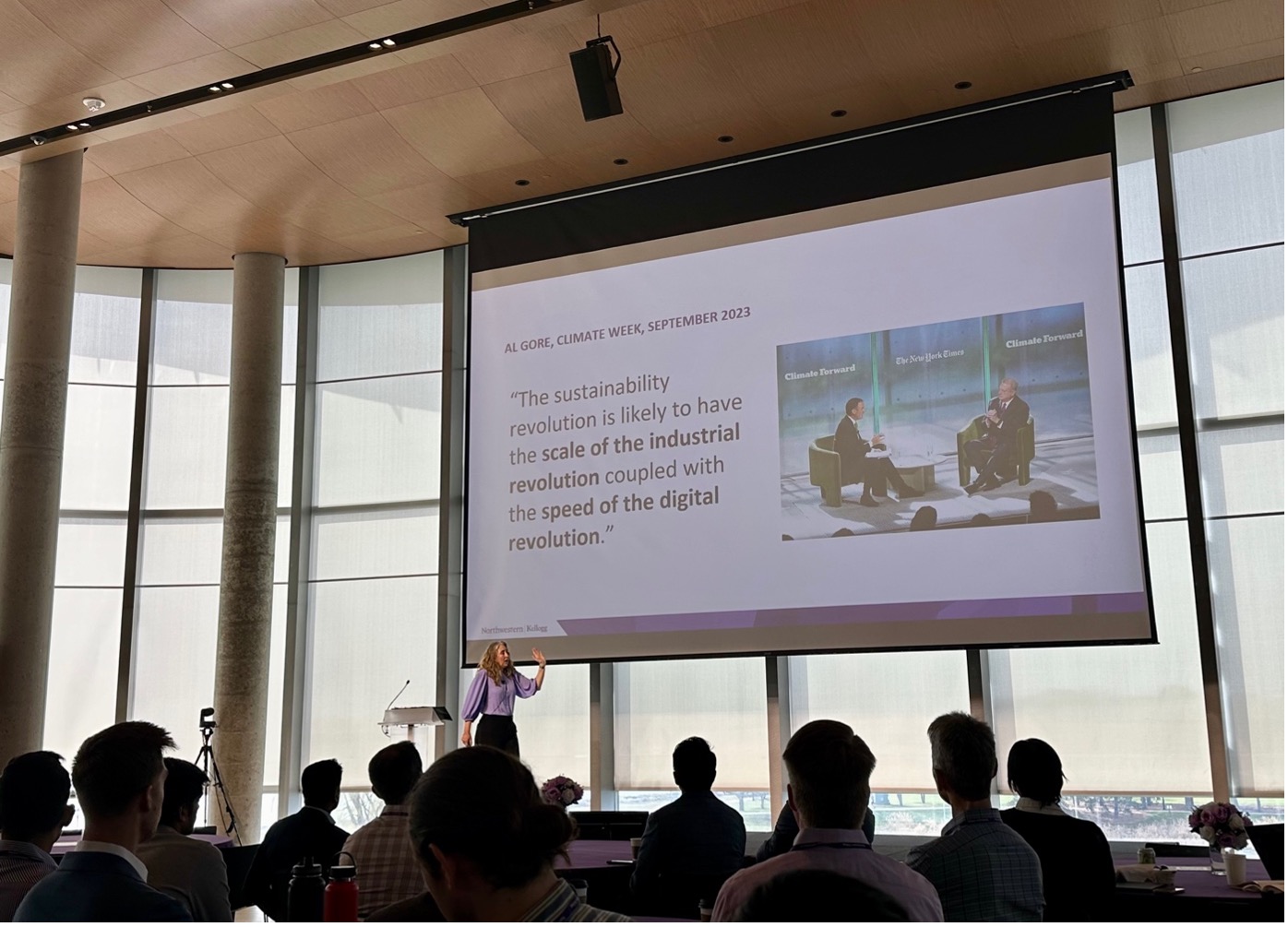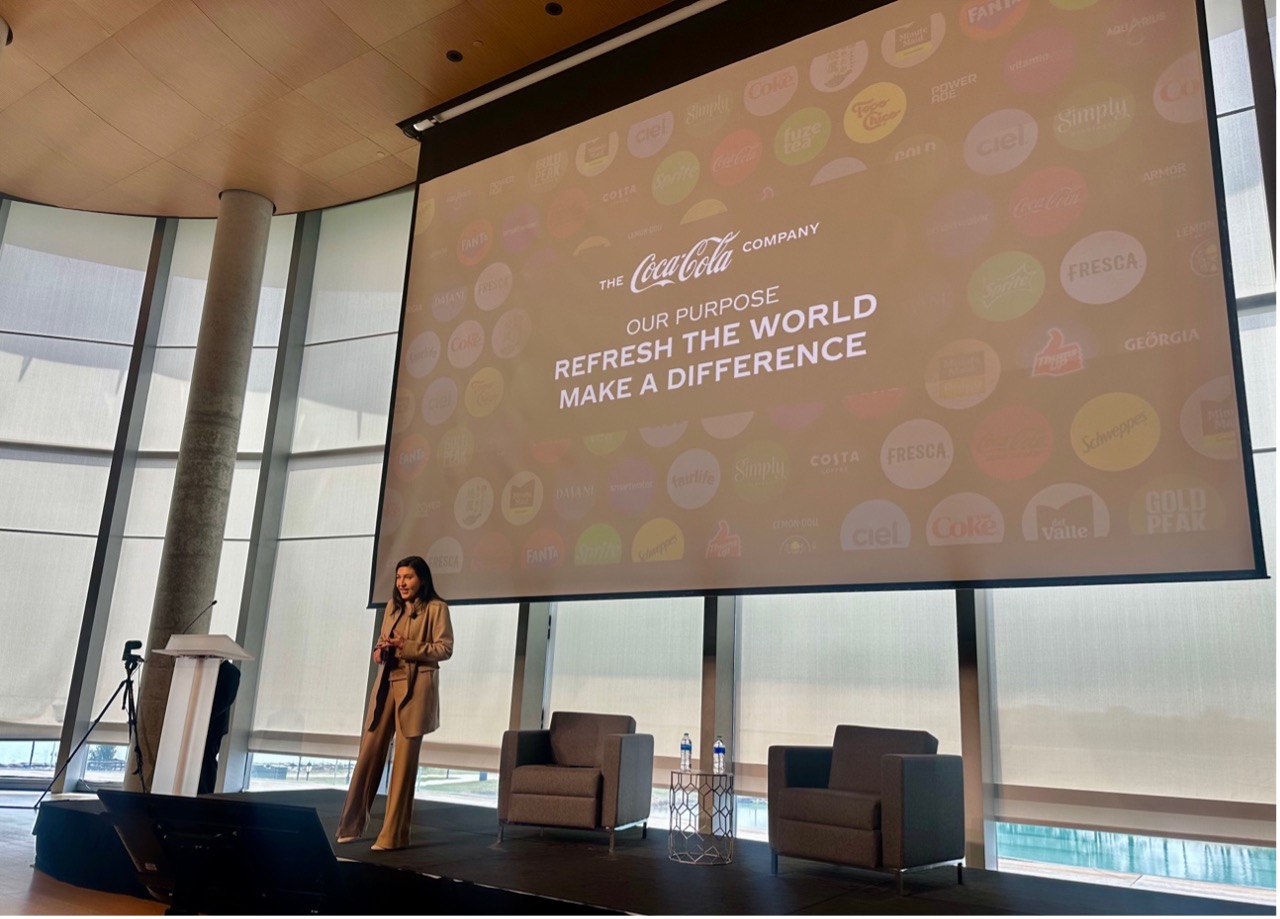
Doris Alvarez, Medill Reports

Doris Alvarez, Medill Reports
By Doris Alvarez
“Leading the Charge,” the theme of an April 10 Kellogg Climate Conference at Northwestern University, brought together an all-stars cast including leaders from Coca-Cola, GM Energy, start-ups, academics and conservation groups to redefine business strategy in a changing climate.
The mission? Counter climate change and find new profit pipelines there as well.
A standing-room-only crowd of business executives, experts, and students explored company examples of innovative and cost-effective climate change mitigation at the all-day conference sponsored by the Kellogg School of Management’s Energy and Sustainability Club and the Trienens Institute for Sustainability and Energy at Northwestern.
Meghan Busse, associate professor of Strategy at the Kellogg School of Management kicked off the conference with what she called, “a greenhouse emissions breakdown,” in other words, a lively lowdown on the challenges ahead.
According to Busse, in the U.S, one-fourth of gas emissions come from electricity generation, one-fourth from transportation, one-fourth from industrial processes, and one-fourth covering both agriculture and buildings. The conference program covered all these sectors and how each one is providing new solutions and innovative technology to decrease emissions.
“Our goal of the day is to leave you all feeling armed to become climate capable leaders where you are willing to ask questions and start thinking about no matter what your job is, how does climate plan into my strategy?” said Busse.
The incentive to act for companies is linked to the impact on their pockets. Climate change is expected to cost U.S. businesses over $1.3 trillion in the next three years. Such high stakes have pushed industries around the world to seek massive technological and business transformations. But experts say that refusing to invest is climate solutions will cost even more in losses due to rising costs, resource uncertainties, extreme weather damage, and other factors.
Keynote speakers included business leaders across the board to share the specifics their companies have implemented to prioritize sustainability as a core component of strategic decision-making. Coca-Cola is the number one plastic polluter in the world, according to Coke’s Executive VP Bea Perez who took center stage her talk on “Navigating Sustainability and Profitability.” She focused on the importance of accountability, transparency and support from top corporate leaders for a company to move toward sustainability. She asked the audience to envision the size of 120,000 Olympic size swimming pools, the pyramid of Giza and every single volcano in the world to show the massive amounts of waste that The Coca-Cola Company generates. She emphasized solutions.
Businesses and consumers should examine a company’s Business and Sustainability Reports to see if sustainability strategy is embedded into the finances of the company, she said. Without that commitment, the measures are irrelevant, said Perez, Global Chief Communication, Sustainability and Strategic Partnerships Officer at Coca-Cola.

According to The Coca-Cola Company’s 2022 Business & Sustainability Report, the company aims to “make 100% of our packaging recyclable globally by 2025— and use at least 50% recycled material in our packaging by 2030.” Perez explained how water, packaging, and climate goals are interconnected and that by creating a circular economy for packaging, they can lower their carbon footprint.
In their 2022 Business & Sustainability Report, Coke claimed that 90% of its packaging is recyclable, 15% of plastic bottles made with polyethylene terephthalate (PET) are recycled, and that 61% of packaging (is) collected for recycling. Coke’s innovation of a 100% plant-based bottle prototype is a key component to helping them achieve their sustainability goals. “If you don’t have strong communities, you can’t have strong businesses,” said Perez.
At the Scaling the Energy Transition panel, key challenges focused on infrastructure development. Shashank Sane, a Kellogg alum, and EVP at Transmission Invenergy, said that supply chain delays are making it challenging for businesses to amplify the grid system. Projects may take up to a decade from supply chain to completion and a major challenge that business owners face is the lack of policy and government support for funding.
At a global scale this sets the U.S behind. For comparison, Germany which backed up by government policy, is capable of placing massive national orders for supplies, while business owners in the U.S are limited by their procurement resources. Consequently, the lack of infrastructure affects other sectors like the transportation sector.
Companies such as NextEraMobility which focuses on developing, constructing, and operating power projects to produce electricity are restricted in mass capacity by the infrastructure of grid placements. However, even with the use of a massive electric plant to compensate for fuel, Yann Kulp, Director Business Development, Fleet Electrification Advisory, argued that having one major source of emissions is better than having millions of sources of emissions, making the carbon capture in one place more manageable.
The panel Seeds of Change: Cultivating A Sustainable Future in Food and Agriculture introduced ancient processes and cutting-edge initiatives as change-makers. Sonali Lamba, co-founder and executive director of The Soil Inventory Project, brought to light how regenerative farming practices could be a greater part of the solution for fighting climate change and restoring our soils through farming.
Regenerative farming, as Lamba explained, roots back to Indigenous practices. This kind of farming focuses on supporting local farmers and even funding their businesses to incentivize healthier farming practices that avoid pesticides, other chemical and erosion-causing practices that harm both Earth and our health.
“Why not pay people to do things the right way,” said Meera Bhat, Global Director of Equitable Conservation for The Nature Conservancy.
This year’s Kellogg Climate Conference brought together an audience of about 300 business leaders and MBA students, each with different perspectives on how to decrease their carbon footprint in their business sector. Regardless of their business strategy, attendees shared Kellogg’s mission that day to educate, strategize and mobilize, for the sake of change.
Doris Alvarez is a graduate student at Northwestern University’s Medill School of Journalism.